Challenges faced by Food Tourism of UK during
VerifiedAdded on 2022/09/01
|10
|2844
|17
AI Summary
Contribute Materials
Your contribution can guide someone’s learning journey. Share your
documents today.
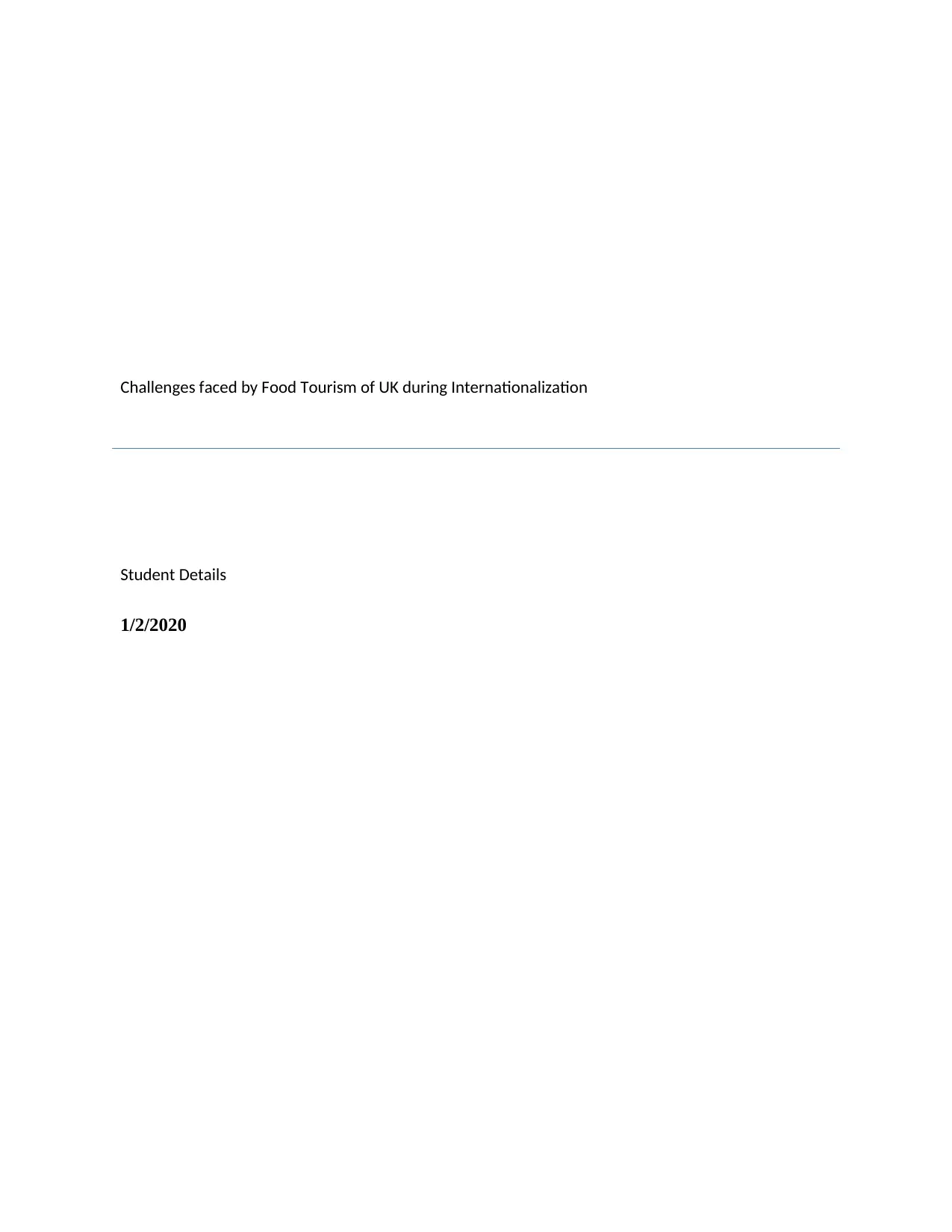
Challenges faced by Food Tourism of UK during Internationalization
Student Details
1/2/2020
Student Details
1/2/2020
Secure Best Marks with AI Grader
Need help grading? Try our AI Grader for instant feedback on your assignments.
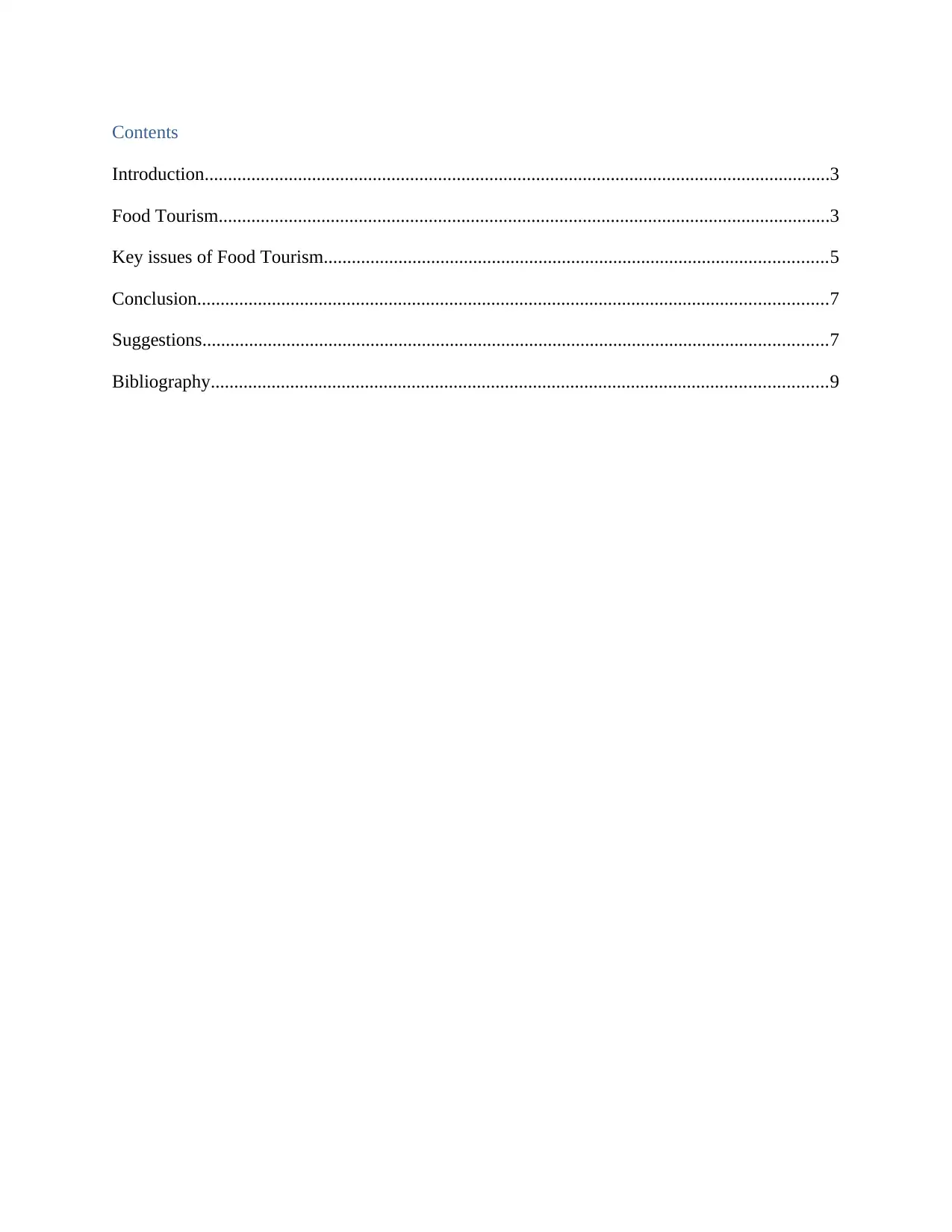
Contents
Introduction......................................................................................................................................3
Food Tourism...................................................................................................................................3
Key issues of Food Tourism............................................................................................................5
Conclusion.......................................................................................................................................7
Suggestions......................................................................................................................................7
Bibliography....................................................................................................................................9
Introduction......................................................................................................................................3
Food Tourism...................................................................................................................................3
Key issues of Food Tourism............................................................................................................5
Conclusion.......................................................................................................................................7
Suggestions......................................................................................................................................7
Bibliography....................................................................................................................................9
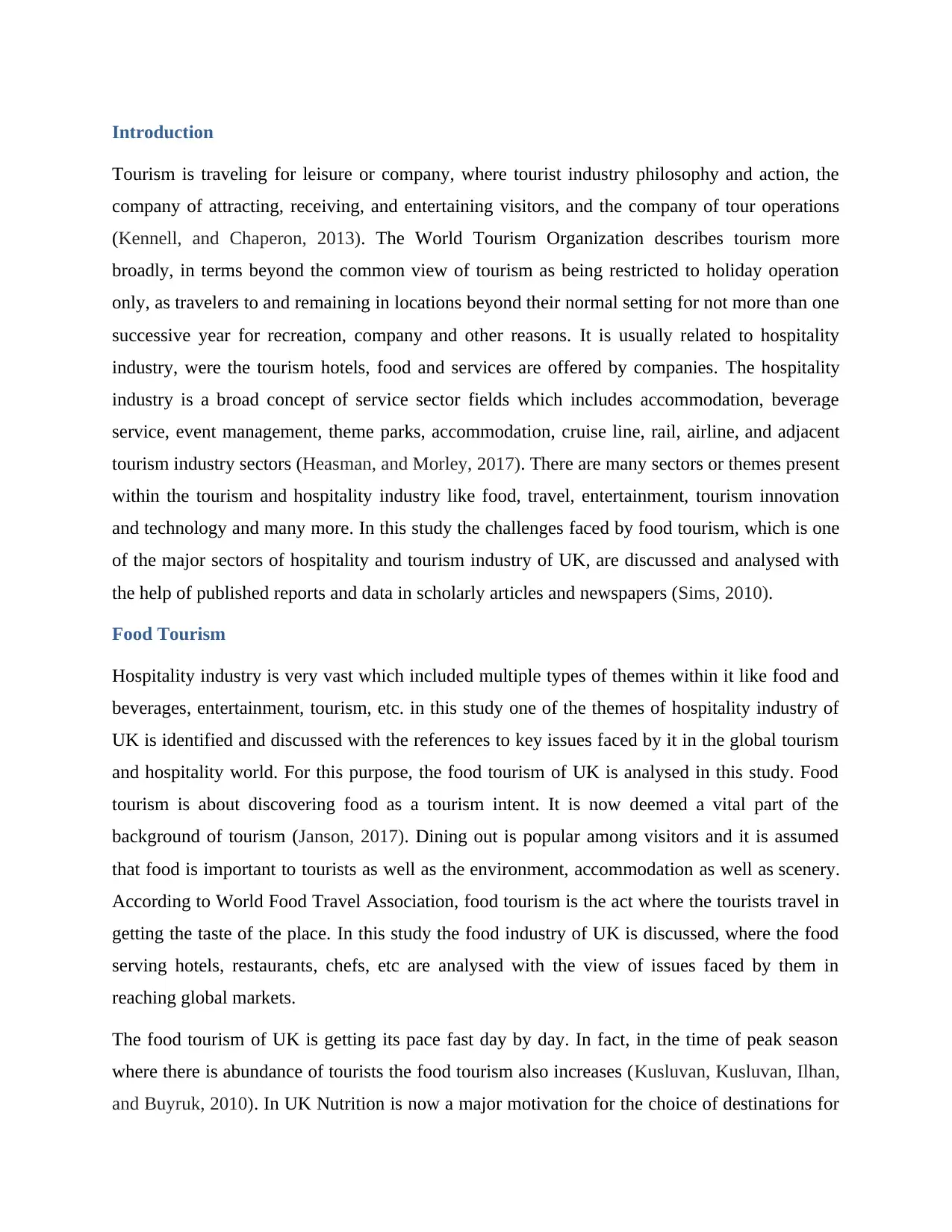
Introduction
Tourism is traveling for leisure or company, where tourist industry philosophy and action, the
company of attracting, receiving, and entertaining visitors, and the company of tour operations
(Kennell, and Chaperon, 2013). The World Tourism Organization describes tourism more
broadly, in terms beyond the common view of tourism as being restricted to holiday operation
only, as travelers to and remaining in locations beyond their normal setting for not more than one
successive year for recreation, company and other reasons. It is usually related to hospitality
industry, were the tourism hotels, food and services are offered by companies. The hospitality
industry is a broad concept of service sector fields which includes accommodation, beverage
service, event management, theme parks, accommodation, cruise line, rail, airline, and adjacent
tourism industry sectors (Heasman, and Morley, 2017). There are many sectors or themes present
within the tourism and hospitality industry like food, travel, entertainment, tourism innovation
and technology and many more. In this study the challenges faced by food tourism, which is one
of the major sectors of hospitality and tourism industry of UK, are discussed and analysed with
the help of published reports and data in scholarly articles and newspapers (Sims, 2010).
Food Tourism
Hospitality industry is very vast which included multiple types of themes within it like food and
beverages, entertainment, tourism, etc. in this study one of the themes of hospitality industry of
UK is identified and discussed with the references to key issues faced by it in the global tourism
and hospitality world. For this purpose, the food tourism of UK is analysed in this study. Food
tourism is about discovering food as a tourism intent. It is now deemed a vital part of the
background of tourism (Janson, 2017). Dining out is popular among visitors and it is assumed
that food is important to tourists as well as the environment, accommodation as well as scenery.
According to World Food Travel Association, food tourism is the act where the tourists travel in
getting the taste of the place. In this study the food industry of UK is discussed, where the food
serving hotels, restaurants, chefs, etc are analysed with the view of issues faced by them in
reaching global markets.
The food tourism of UK is getting its pace fast day by day. In fact, in the time of peak season
where there is abundance of tourists the food tourism also increases (Kusluvan, Kusluvan, Ilhan,
and Buyruk, 2010). In UK Nutrition is now a major motivation for the choice of destinations for
Tourism is traveling for leisure or company, where tourist industry philosophy and action, the
company of attracting, receiving, and entertaining visitors, and the company of tour operations
(Kennell, and Chaperon, 2013). The World Tourism Organization describes tourism more
broadly, in terms beyond the common view of tourism as being restricted to holiday operation
only, as travelers to and remaining in locations beyond their normal setting for not more than one
successive year for recreation, company and other reasons. It is usually related to hospitality
industry, were the tourism hotels, food and services are offered by companies. The hospitality
industry is a broad concept of service sector fields which includes accommodation, beverage
service, event management, theme parks, accommodation, cruise line, rail, airline, and adjacent
tourism industry sectors (Heasman, and Morley, 2017). There are many sectors or themes present
within the tourism and hospitality industry like food, travel, entertainment, tourism innovation
and technology and many more. In this study the challenges faced by food tourism, which is one
of the major sectors of hospitality and tourism industry of UK, are discussed and analysed with
the help of published reports and data in scholarly articles and newspapers (Sims, 2010).
Food Tourism
Hospitality industry is very vast which included multiple types of themes within it like food and
beverages, entertainment, tourism, etc. in this study one of the themes of hospitality industry of
UK is identified and discussed with the references to key issues faced by it in the global tourism
and hospitality world. For this purpose, the food tourism of UK is analysed in this study. Food
tourism is about discovering food as a tourism intent. It is now deemed a vital part of the
background of tourism (Janson, 2017). Dining out is popular among visitors and it is assumed
that food is important to tourists as well as the environment, accommodation as well as scenery.
According to World Food Travel Association, food tourism is the act where the tourists travel in
getting the taste of the place. In this study the food industry of UK is discussed, where the food
serving hotels, restaurants, chefs, etc are analysed with the view of issues faced by them in
reaching global markets.
The food tourism of UK is getting its pace fast day by day. In fact, in the time of peak season
where there is abundance of tourists the food tourism also increases (Kusluvan, Kusluvan, Ilhan,
and Buyruk, 2010). In UK Nutrition is now a major motivation for the choice of destinations for
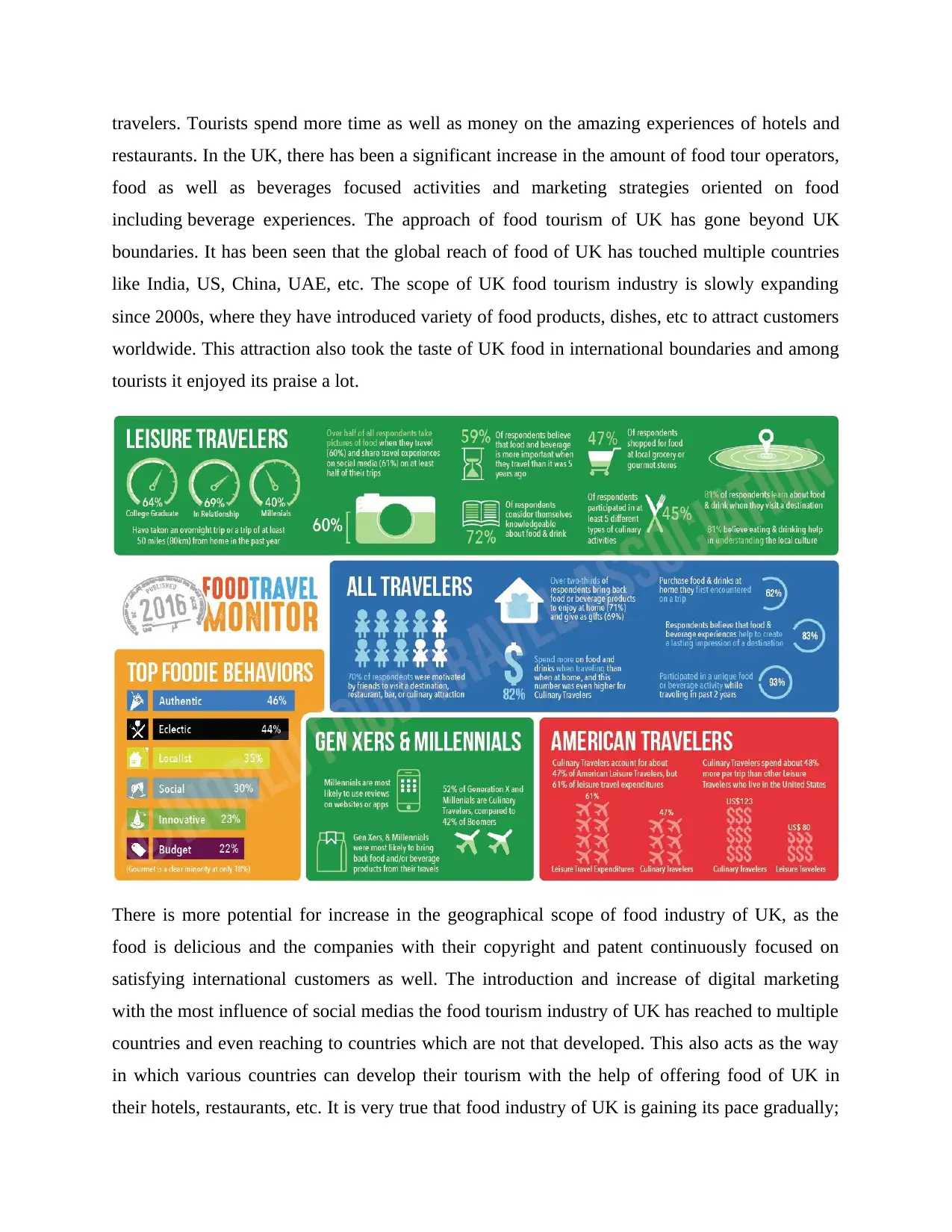
travelers. Tourists spend more time as well as money on the amazing experiences of hotels and
restaurants. In the UK, there has been a significant increase in the amount of food tour operators,
food as well as beverages focused activities and marketing strategies oriented on food
including beverage experiences. The approach of food tourism of UK has gone beyond UK
boundaries. It has been seen that the global reach of food of UK has touched multiple countries
like India, US, China, UAE, etc. The scope of UK food tourism industry is slowly expanding
since 2000s, where they have introduced variety of food products, dishes, etc to attract customers
worldwide. This attraction also took the taste of UK food in international boundaries and among
tourists it enjoyed its praise a lot.
There is more potential for increase in the geographical scope of food industry of UK, as the
food is delicious and the companies with their copyright and patent continuously focused on
satisfying international customers as well. The introduction and increase of digital marketing
with the most influence of social medias the food tourism industry of UK has reached to multiple
countries and even reaching to countries which are not that developed. This also acts as the way
in which various countries can develop their tourism with the help of offering food of UK in
their hotels, restaurants, etc. It is very true that food industry of UK is gaining its pace gradually;
restaurants. In the UK, there has been a significant increase in the amount of food tour operators,
food as well as beverages focused activities and marketing strategies oriented on food
including beverage experiences. The approach of food tourism of UK has gone beyond UK
boundaries. It has been seen that the global reach of food of UK has touched multiple countries
like India, US, China, UAE, etc. The scope of UK food tourism industry is slowly expanding
since 2000s, where they have introduced variety of food products, dishes, etc to attract customers
worldwide. This attraction also took the taste of UK food in international boundaries and among
tourists it enjoyed its praise a lot.
There is more potential for increase in the geographical scope of food industry of UK, as the
food is delicious and the companies with their copyright and patent continuously focused on
satisfying international customers as well. The introduction and increase of digital marketing
with the most influence of social medias the food tourism industry of UK has reached to multiple
countries and even reaching to countries which are not that developed. This also acts as the way
in which various countries can develop their tourism with the help of offering food of UK in
their hotels, restaurants, etc. It is very true that food industry of UK is gaining its pace gradually;
Secure Best Marks with AI Grader
Need help grading? Try our AI Grader for instant feedback on your assignments.
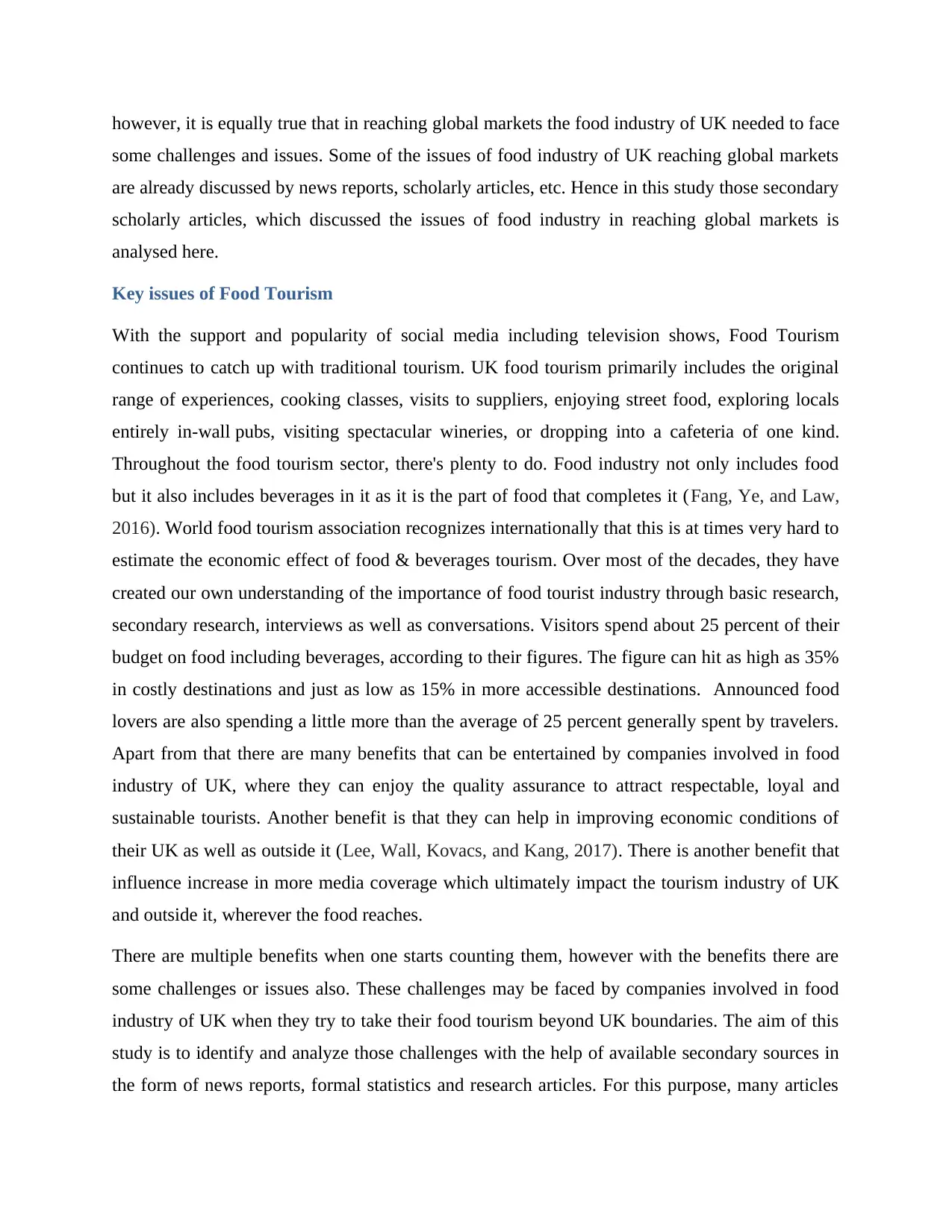
however, it is equally true that in reaching global markets the food industry of UK needed to face
some challenges and issues. Some of the issues of food industry of UK reaching global markets
are already discussed by news reports, scholarly articles, etc. Hence in this study those secondary
scholarly articles, which discussed the issues of food industry in reaching global markets is
analysed here.
Key issues of Food Tourism
With the support and popularity of social media including television shows, Food Tourism
continues to catch up with traditional tourism. UK food tourism primarily includes the original
range of experiences, cooking classes, visits to suppliers, enjoying street food, exploring locals
entirely in-wall pubs, visiting spectacular wineries, or dropping into a cafeteria of one kind.
Throughout the food tourism sector, there's plenty to do. Food industry not only includes food
but it also includes beverages in it as it is the part of food that completes it (Fang, Ye, and Law,
2016). World food tourism association recognizes internationally that this is at times very hard to
estimate the economic effect of food & beverages tourism. Over most of the decades, they have
created our own understanding of the importance of food tourist industry through basic research,
secondary research, interviews as well as conversations. Visitors spend about 25 percent of their
budget on food including beverages, according to their figures. The figure can hit as high as 35%
in costly destinations and just as low as 15% in more accessible destinations. Announced food
lovers are also spending a little more than the average of 25 percent generally spent by travelers.
Apart from that there are many benefits that can be entertained by companies involved in food
industry of UK, where they can enjoy the quality assurance to attract respectable, loyal and
sustainable tourists. Another benefit is that they can help in improving economic conditions of
their UK as well as outside it (Lee, Wall, Kovacs, and Kang, 2017). There is another benefit that
influence increase in more media coverage which ultimately impact the tourism industry of UK
and outside it, wherever the food reaches.
There are multiple benefits when one starts counting them, however with the benefits there are
some challenges or issues also. These challenges may be faced by companies involved in food
industry of UK when they try to take their food tourism beyond UK boundaries. The aim of this
study is to identify and analyze those challenges with the help of available secondary sources in
the form of news reports, formal statistics and research articles. For this purpose, many articles
some challenges and issues. Some of the issues of food industry of UK reaching global markets
are already discussed by news reports, scholarly articles, etc. Hence in this study those secondary
scholarly articles, which discussed the issues of food industry in reaching global markets is
analysed here.
Key issues of Food Tourism
With the support and popularity of social media including television shows, Food Tourism
continues to catch up with traditional tourism. UK food tourism primarily includes the original
range of experiences, cooking classes, visits to suppliers, enjoying street food, exploring locals
entirely in-wall pubs, visiting spectacular wineries, or dropping into a cafeteria of one kind.
Throughout the food tourism sector, there's plenty to do. Food industry not only includes food
but it also includes beverages in it as it is the part of food that completes it (Fang, Ye, and Law,
2016). World food tourism association recognizes internationally that this is at times very hard to
estimate the economic effect of food & beverages tourism. Over most of the decades, they have
created our own understanding of the importance of food tourist industry through basic research,
secondary research, interviews as well as conversations. Visitors spend about 25 percent of their
budget on food including beverages, according to their figures. The figure can hit as high as 35%
in costly destinations and just as low as 15% in more accessible destinations. Announced food
lovers are also spending a little more than the average of 25 percent generally spent by travelers.
Apart from that there are many benefits that can be entertained by companies involved in food
industry of UK, where they can enjoy the quality assurance to attract respectable, loyal and
sustainable tourists. Another benefit is that they can help in improving economic conditions of
their UK as well as outside it (Lee, Wall, Kovacs, and Kang, 2017). There is another benefit that
influence increase in more media coverage which ultimately impact the tourism industry of UK
and outside it, wherever the food reaches.
There are multiple benefits when one starts counting them, however with the benefits there are
some challenges or issues also. These challenges may be faced by companies involved in food
industry of UK when they try to take their food tourism beyond UK boundaries. The aim of this
study is to identify and analyze those challenges with the help of available secondary sources in
the form of news reports, formal statistics and research articles. For this purpose, many articles
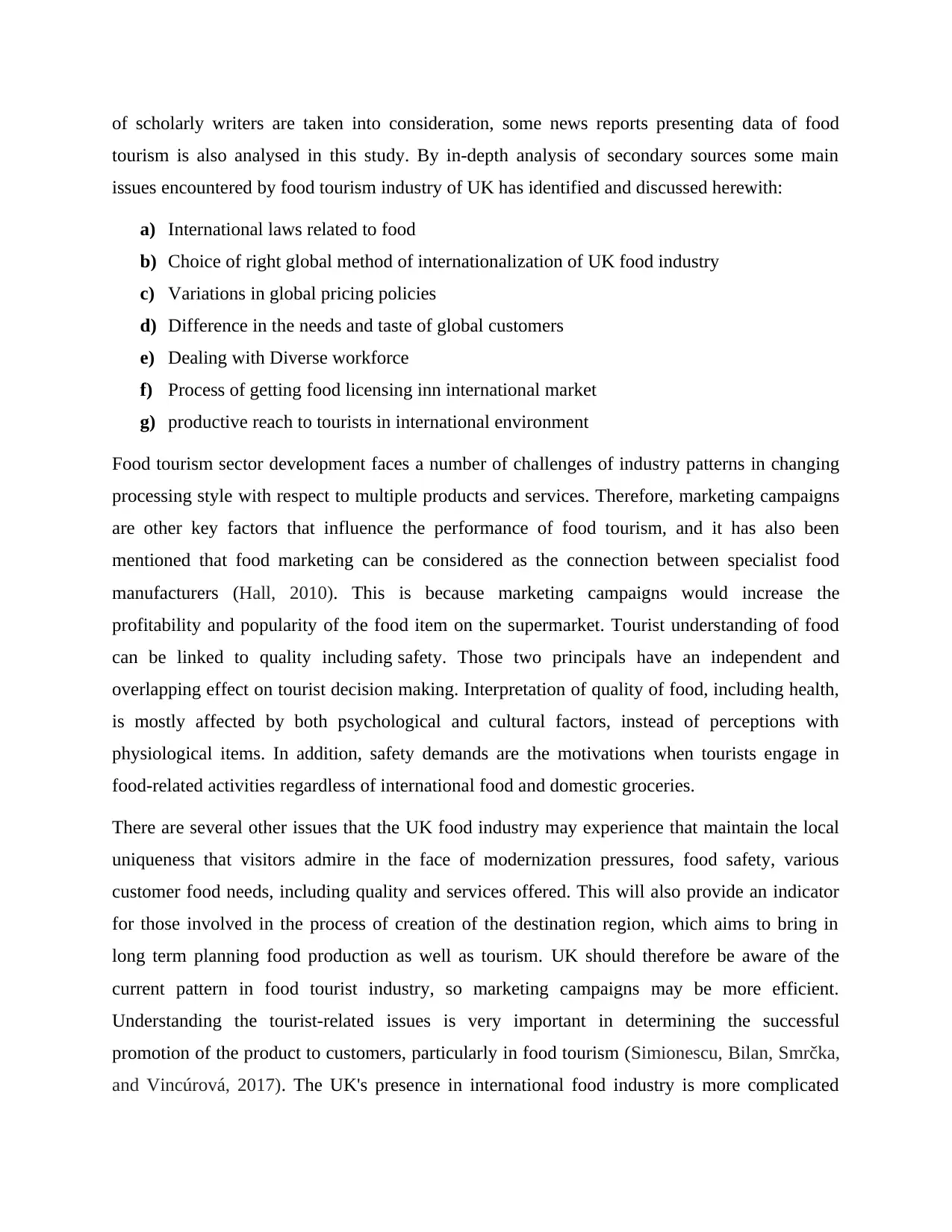
of scholarly writers are taken into consideration, some news reports presenting data of food
tourism is also analysed in this study. By in-depth analysis of secondary sources some main
issues encountered by food tourism industry of UK has identified and discussed herewith:
a) International laws related to food
b) Choice of right global method of internationalization of UK food industry
c) Variations in global pricing policies
d) Difference in the needs and taste of global customers
e) Dealing with Diverse workforce
f) Process of getting food licensing inn international market
g) productive reach to tourists in international environment
Food tourism sector development faces a number of challenges of industry patterns in changing
processing style with respect to multiple products and services. Therefore, marketing campaigns
are other key factors that influence the performance of food tourism, and it has also been
mentioned that food marketing can be considered as the connection between specialist food
manufacturers (Hall, 2010). This is because marketing campaigns would increase the
profitability and popularity of the food item on the supermarket. Tourist understanding of food
can be linked to quality including safety. Those two principals have an independent and
overlapping effect on tourist decision making. Interpretation of quality of food, including health,
is mostly affected by both psychological and cultural factors, instead of perceptions with
physiological items. In addition, safety demands are the motivations when tourists engage in
food-related activities regardless of international food and domestic groceries.
There are several other issues that the UK food industry may experience that maintain the local
uniqueness that visitors admire in the face of modernization pressures, food safety, various
customer food needs, including quality and services offered. This will also provide an indicator
for those involved in the process of creation of the destination region, which aims to bring in
long term planning food production as well as tourism. UK should therefore be aware of the
current pattern in food tourist industry, so marketing campaigns may be more efficient.
Understanding the tourist-related issues is very important in determining the successful
promotion of the product to customers, particularly in food tourism (Simionescu, Bilan, Smrčka,
and Vincúrová, 2017). The UK's presence in international food industry is more complicated
tourism is also analysed in this study. By in-depth analysis of secondary sources some main
issues encountered by food tourism industry of UK has identified and discussed herewith:
a) International laws related to food
b) Choice of right global method of internationalization of UK food industry
c) Variations in global pricing policies
d) Difference in the needs and taste of global customers
e) Dealing with Diverse workforce
f) Process of getting food licensing inn international market
g) productive reach to tourists in international environment
Food tourism sector development faces a number of challenges of industry patterns in changing
processing style with respect to multiple products and services. Therefore, marketing campaigns
are other key factors that influence the performance of food tourism, and it has also been
mentioned that food marketing can be considered as the connection between specialist food
manufacturers (Hall, 2010). This is because marketing campaigns would increase the
profitability and popularity of the food item on the supermarket. Tourist understanding of food
can be linked to quality including safety. Those two principals have an independent and
overlapping effect on tourist decision making. Interpretation of quality of food, including health,
is mostly affected by both psychological and cultural factors, instead of perceptions with
physiological items. In addition, safety demands are the motivations when tourists engage in
food-related activities regardless of international food and domestic groceries.
There are several other issues that the UK food industry may experience that maintain the local
uniqueness that visitors admire in the face of modernization pressures, food safety, various
customer food needs, including quality and services offered. This will also provide an indicator
for those involved in the process of creation of the destination region, which aims to bring in
long term planning food production as well as tourism. UK should therefore be aware of the
current pattern in food tourist industry, so marketing campaigns may be more efficient.
Understanding the tourist-related issues is very important in determining the successful
promotion of the product to customers, particularly in food tourism (Simionescu, Bilan, Smrčka,
and Vincúrová, 2017). The UK's presence in international food industry is more complicated
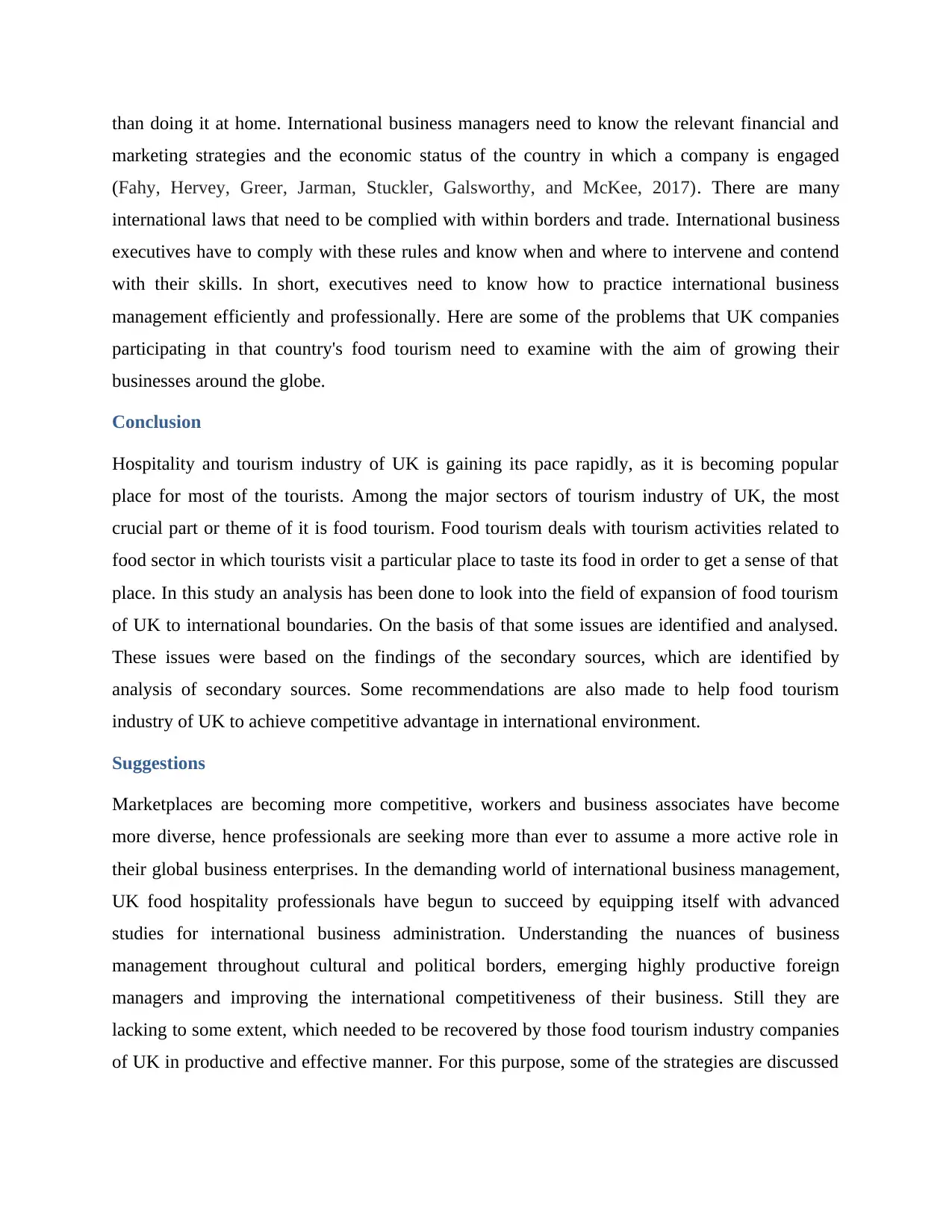
than doing it at home. International business managers need to know the relevant financial and
marketing strategies and the economic status of the country in which a company is engaged
(Fahy, Hervey, Greer, Jarman, Stuckler, Galsworthy, and McKee, 2017). There are many
international laws that need to be complied with within borders and trade. International business
executives have to comply with these rules and know when and where to intervene and contend
with their skills. In short, executives need to know how to practice international business
management efficiently and professionally. Here are some of the problems that UK companies
participating in that country's food tourism need to examine with the aim of growing their
businesses around the globe.
Conclusion
Hospitality and tourism industry of UK is gaining its pace rapidly, as it is becoming popular
place for most of the tourists. Among the major sectors of tourism industry of UK, the most
crucial part or theme of it is food tourism. Food tourism deals with tourism activities related to
food sector in which tourists visit a particular place to taste its food in order to get a sense of that
place. In this study an analysis has been done to look into the field of expansion of food tourism
of UK to international boundaries. On the basis of that some issues are identified and analysed.
These issues were based on the findings of the secondary sources, which are identified by
analysis of secondary sources. Some recommendations are also made to help food tourism
industry of UK to achieve competitive advantage in international environment.
Suggestions
Marketplaces are becoming more competitive, workers and business associates have become
more diverse, hence professionals are seeking more than ever to assume a more active role in
their global business enterprises. In the demanding world of international business management,
UK food hospitality professionals have begun to succeed by equipping itself with advanced
studies for international business administration. Understanding the nuances of business
management throughout cultural and political borders, emerging highly productive foreign
managers and improving the international competitiveness of their business. Still they are
lacking to some extent, which needed to be recovered by those food tourism industry companies
of UK in productive and effective manner. For this purpose, some of the strategies are discussed
marketing strategies and the economic status of the country in which a company is engaged
(Fahy, Hervey, Greer, Jarman, Stuckler, Galsworthy, and McKee, 2017). There are many
international laws that need to be complied with within borders and trade. International business
executives have to comply with these rules and know when and where to intervene and contend
with their skills. In short, executives need to know how to practice international business
management efficiently and professionally. Here are some of the problems that UK companies
participating in that country's food tourism need to examine with the aim of growing their
businesses around the globe.
Conclusion
Hospitality and tourism industry of UK is gaining its pace rapidly, as it is becoming popular
place for most of the tourists. Among the major sectors of tourism industry of UK, the most
crucial part or theme of it is food tourism. Food tourism deals with tourism activities related to
food sector in which tourists visit a particular place to taste its food in order to get a sense of that
place. In this study an analysis has been done to look into the field of expansion of food tourism
of UK to international boundaries. On the basis of that some issues are identified and analysed.
These issues were based on the findings of the secondary sources, which are identified by
analysis of secondary sources. Some recommendations are also made to help food tourism
industry of UK to achieve competitive advantage in international environment.
Suggestions
Marketplaces are becoming more competitive, workers and business associates have become
more diverse, hence professionals are seeking more than ever to assume a more active role in
their global business enterprises. In the demanding world of international business management,
UK food hospitality professionals have begun to succeed by equipping itself with advanced
studies for international business administration. Understanding the nuances of business
management throughout cultural and political borders, emerging highly productive foreign
managers and improving the international competitiveness of their business. Still they are
lacking to some extent, which needed to be recovered by those food tourism industry companies
of UK in productive and effective manner. For this purpose, some of the strategies are discussed
Paraphrase This Document
Need a fresh take? Get an instant paraphrase of this document with our AI Paraphraser
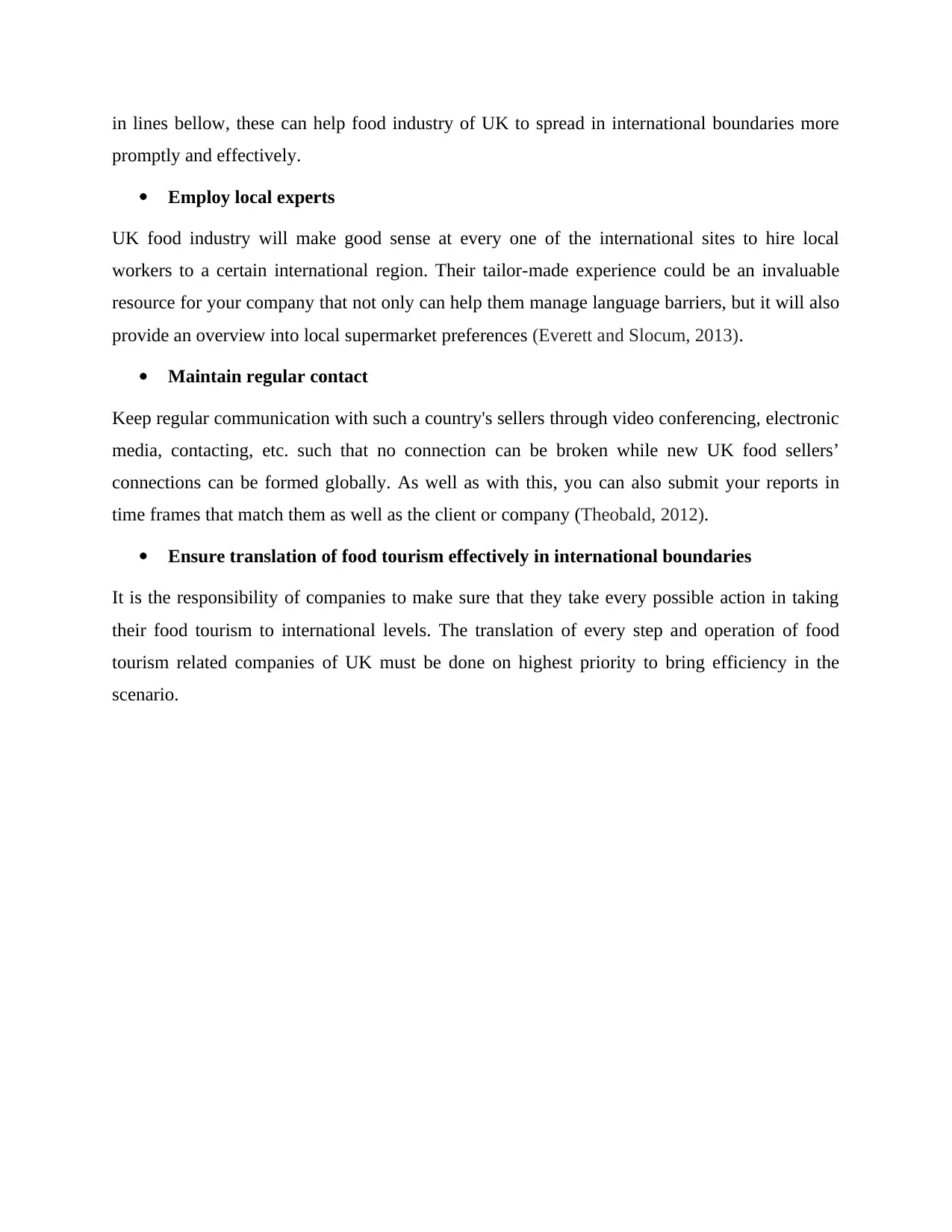
in lines bellow, these can help food industry of UK to spread in international boundaries more
promptly and effectively.
Employ local experts
UK food industry will make good sense at every one of the international sites to hire local
workers to a certain international region. Their tailor-made experience could be an invaluable
resource for your company that not only can help them manage language barriers, but it will also
provide an overview into local supermarket preferences (Everett and Slocum, 2013).
Maintain regular contact
Keep regular communication with such a country's sellers through video conferencing, electronic
media, contacting, etc. such that no connection can be broken while new UK food sellers’
connections can be formed globally. As well as with this, you can also submit your reports in
time frames that match them as well as the client or company (Theobald, 2012).
Ensure translation of food tourism effectively in international boundaries
It is the responsibility of companies to make sure that they take every possible action in taking
their food tourism to international levels. The translation of every step and operation of food
tourism related companies of UK must be done on highest priority to bring efficiency in the
scenario.
promptly and effectively.
Employ local experts
UK food industry will make good sense at every one of the international sites to hire local
workers to a certain international region. Their tailor-made experience could be an invaluable
resource for your company that not only can help them manage language barriers, but it will also
provide an overview into local supermarket preferences (Everett and Slocum, 2013).
Maintain regular contact
Keep regular communication with such a country's sellers through video conferencing, electronic
media, contacting, etc. such that no connection can be broken while new UK food sellers’
connections can be formed globally. As well as with this, you can also submit your reports in
time frames that match them as well as the client or company (Theobald, 2012).
Ensure translation of food tourism effectively in international boundaries
It is the responsibility of companies to make sure that they take every possible action in taking
their food tourism to international levels. The translation of every step and operation of food
tourism related companies of UK must be done on highest priority to bring efficiency in the
scenario.
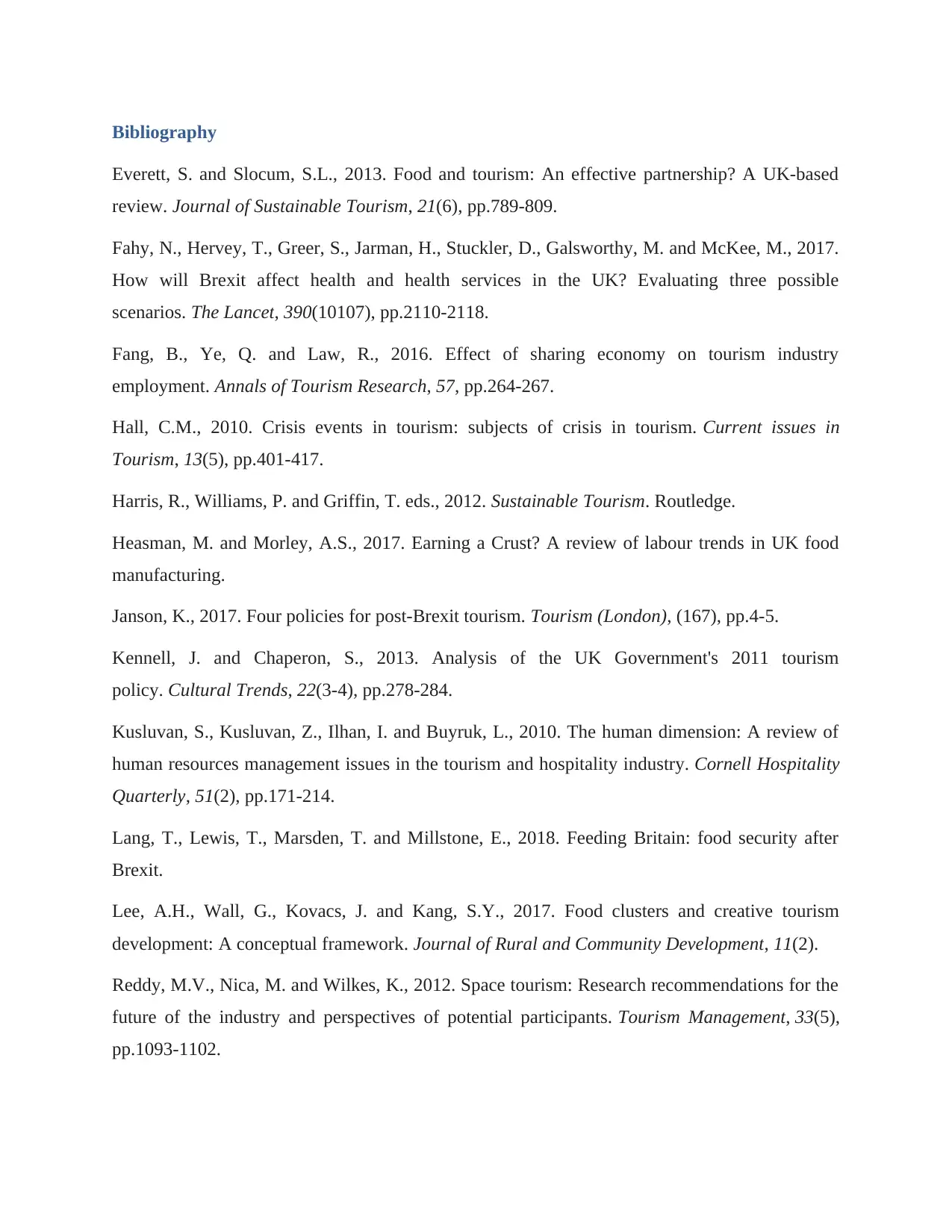
Bibliography
Everett, S. and Slocum, S.L., 2013. Food and tourism: An effective partnership? A UK-based
review. Journal of Sustainable Tourism, 21(6), pp.789-809.
Fahy, N., Hervey, T., Greer, S., Jarman, H., Stuckler, D., Galsworthy, M. and McKee, M., 2017.
How will Brexit affect health and health services in the UK? Evaluating three possible
scenarios. The Lancet, 390(10107), pp.2110-2118.
Fang, B., Ye, Q. and Law, R., 2016. Effect of sharing economy on tourism industry
employment. Annals of Tourism Research, 57, pp.264-267.
Hall, C.M., 2010. Crisis events in tourism: subjects of crisis in tourism. Current issues in
Tourism, 13(5), pp.401-417.
Harris, R., Williams, P. and Griffin, T. eds., 2012. Sustainable Tourism. Routledge.
Heasman, M. and Morley, A.S., 2017. Earning a Crust? A review of labour trends in UK food
manufacturing.
Janson, K., 2017. Four policies for post-Brexit tourism. Tourism (London), (167), pp.4-5.
Kennell, J. and Chaperon, S., 2013. Analysis of the UK Government's 2011 tourism
policy. Cultural Trends, 22(3-4), pp.278-284.
Kusluvan, S., Kusluvan, Z., Ilhan, I. and Buyruk, L., 2010. The human dimension: A review of
human resources management issues in the tourism and hospitality industry. Cornell Hospitality
Quarterly, 51(2), pp.171-214.
Lang, T., Lewis, T., Marsden, T. and Millstone, E., 2018. Feeding Britain: food security after
Brexit.
Lee, A.H., Wall, G., Kovacs, J. and Kang, S.Y., 2017. Food clusters and creative tourism
development: A conceptual framework. Journal of Rural and Community Development, 11(2).
Reddy, M.V., Nica, M. and Wilkes, K., 2012. Space tourism: Research recommendations for the
future of the industry and perspectives of potential participants. Tourism Management, 33(5),
pp.1093-1102.
Everett, S. and Slocum, S.L., 2013. Food and tourism: An effective partnership? A UK-based
review. Journal of Sustainable Tourism, 21(6), pp.789-809.
Fahy, N., Hervey, T., Greer, S., Jarman, H., Stuckler, D., Galsworthy, M. and McKee, M., 2017.
How will Brexit affect health and health services in the UK? Evaluating three possible
scenarios. The Lancet, 390(10107), pp.2110-2118.
Fang, B., Ye, Q. and Law, R., 2016. Effect of sharing economy on tourism industry
employment. Annals of Tourism Research, 57, pp.264-267.
Hall, C.M., 2010. Crisis events in tourism: subjects of crisis in tourism. Current issues in
Tourism, 13(5), pp.401-417.
Harris, R., Williams, P. and Griffin, T. eds., 2012. Sustainable Tourism. Routledge.
Heasman, M. and Morley, A.S., 2017. Earning a Crust? A review of labour trends in UK food
manufacturing.
Janson, K., 2017. Four policies for post-Brexit tourism. Tourism (London), (167), pp.4-5.
Kennell, J. and Chaperon, S., 2013. Analysis of the UK Government's 2011 tourism
policy. Cultural Trends, 22(3-4), pp.278-284.
Kusluvan, S., Kusluvan, Z., Ilhan, I. and Buyruk, L., 2010. The human dimension: A review of
human resources management issues in the tourism and hospitality industry. Cornell Hospitality
Quarterly, 51(2), pp.171-214.
Lang, T., Lewis, T., Marsden, T. and Millstone, E., 2018. Feeding Britain: food security after
Brexit.
Lee, A.H., Wall, G., Kovacs, J. and Kang, S.Y., 2017. Food clusters and creative tourism
development: A conceptual framework. Journal of Rural and Community Development, 11(2).
Reddy, M.V., Nica, M. and Wilkes, K., 2012. Space tourism: Research recommendations for the
future of the industry and perspectives of potential participants. Tourism Management, 33(5),
pp.1093-1102.
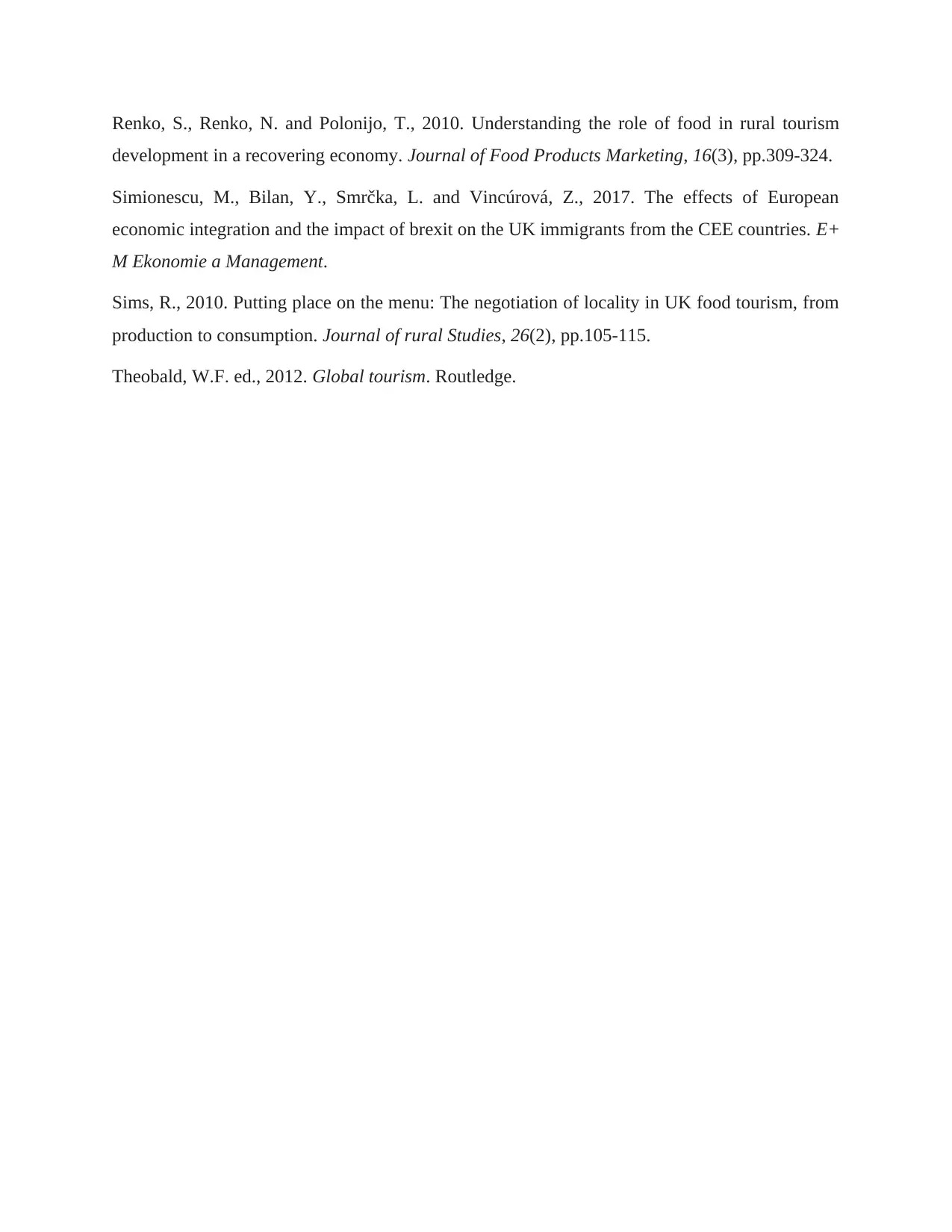
Renko, S., Renko, N. and Polonijo, T., 2010. Understanding the role of food in rural tourism
development in a recovering economy. Journal of Food Products Marketing, 16(3), pp.309-324.
Simionescu, M., Bilan, Y., Smrčka, L. and Vincúrová, Z., 2017. The effects of European
economic integration and the impact of brexit on the UK immigrants from the CEE countries. E+
M Ekonomie a Management.
Sims, R., 2010. Putting place on the menu: The negotiation of locality in UK food tourism, from
production to consumption. Journal of rural Studies, 26(2), pp.105-115.
Theobald, W.F. ed., 2012. Global tourism. Routledge.
development in a recovering economy. Journal of Food Products Marketing, 16(3), pp.309-324.
Simionescu, M., Bilan, Y., Smrčka, L. and Vincúrová, Z., 2017. The effects of European
economic integration and the impact of brexit on the UK immigrants from the CEE countries. E+
M Ekonomie a Management.
Sims, R., 2010. Putting place on the menu: The negotiation of locality in UK food tourism, from
production to consumption. Journal of rural Studies, 26(2), pp.105-115.
Theobald, W.F. ed., 2012. Global tourism. Routledge.
1 out of 10
Related Documents
Your All-in-One AI-Powered Toolkit for Academic Success.
+13062052269
info@desklib.com
Available 24*7 on WhatsApp / Email
![[object Object]](/_next/static/media/star-bottom.7253800d.svg)
Unlock your academic potential
© 2024 | Zucol Services PVT LTD | All rights reserved.





